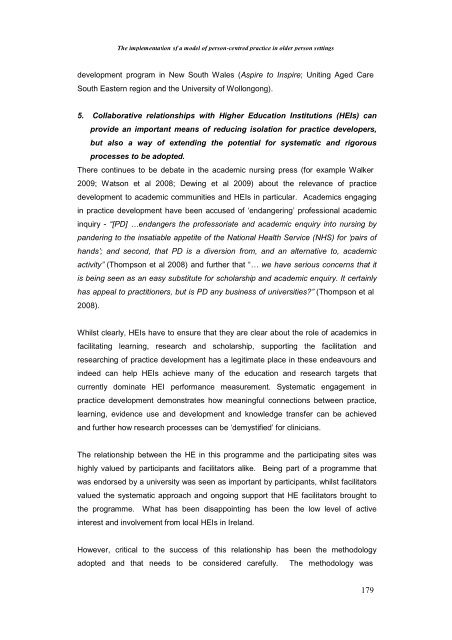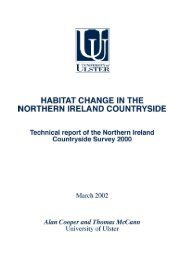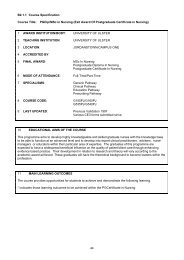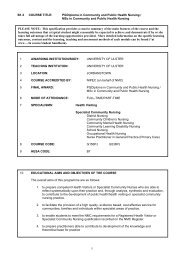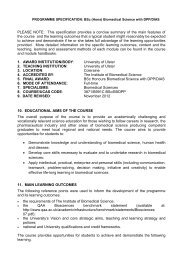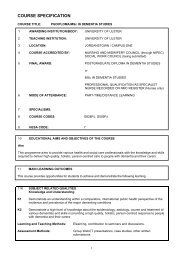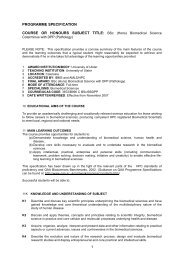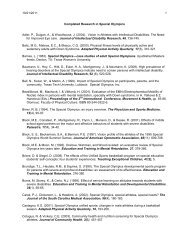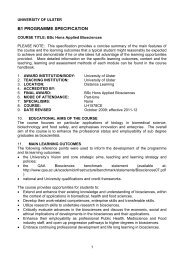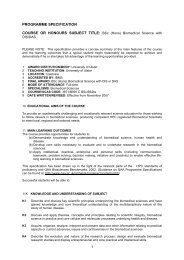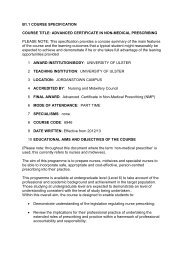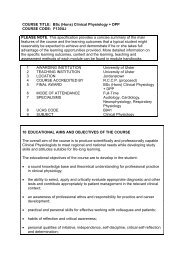The Implementation of a Model of Person-Centred Practice In Older ...
The Implementation of a Model of Person-Centred Practice In Older ...
The Implementation of a Model of Person-Centred Practice In Older ...
You also want an ePaper? Increase the reach of your titles
YUMPU automatically turns print PDFs into web optimized ePapers that Google loves.
<strong>The</strong> implementation <strong>of</strong> a model <strong>of</strong> person-centred practice in older person settings<br />
development program in New South Wales (Aspire to <strong>In</strong>spire; Uniting Aged Care<br />
South Eastern region and the University <strong>of</strong> Wollongong).<br />
5. Collaborative relationships with Higher Education <strong>In</strong>stitutions (HEIs) can<br />
provide an important means <strong>of</strong> reducing isolation for practice developers,<br />
but also a way <strong>of</strong> extending the potential for systematic and rigorous<br />
processes to be adopted.<br />
<strong>The</strong>re continues to be debate in the academic nursing press (for example Walker<br />
2009; Watson et al 2008; Dewing et al 2009) about the relevance <strong>of</strong> practice<br />
development to academic communities and HEIs in particular. Academics engaging<br />
in practice development have been accused <strong>of</strong> ‘endangering’ pr<strong>of</strong>essional academic<br />
inquiry - “[PD] …endangers the pr<strong>of</strong>essoriate and academic enquiry into nursing by<br />
pandering to the insatiable appetite <strong>of</strong> the National Health Service (NHS) for ‘pairs <strong>of</strong><br />
hands’; and second, that PD is a diversion from, and an alternative to, academic<br />
activity” (Thompson et al 2008) and further that “… we have serious concerns that it<br />
is being seen as an easy substitute for scholarship and academic enquiry. It certainly<br />
has appeal to practitioners, but is PD any business <strong>of</strong> universities?” (Thompson et al<br />
2008).<br />
Whilst clearly, HEIs have to ensure that they are clear about the role <strong>of</strong> academics in<br />
facilitating learning, research and scholarship, supporting the facilitation and<br />
researching <strong>of</strong> practice development has a legitimate place in these endeavours and<br />
indeed can help HEIs achieve many <strong>of</strong> the education and research targets that<br />
currently dominate HEI performance measurement. Systematic engagement in<br />
practice development demonstrates how meaningful connections between practice,<br />
learning, evidence use and development and knowledge transfer can be achieved<br />
and further how research processes can be ‘demystified’ for clinicians.<br />
<strong>The</strong> relationship between the HE in this programme and the participating sites was<br />
highly valued by participants and facilitators alike. Being part <strong>of</strong> a programme that<br />
was endorsed by a university was seen as important by participants, whilst facilitators<br />
valued the systematic approach and ongoing support that HE facilitators brought to<br />
the programme. What has been disappointing has been the low level <strong>of</strong> active<br />
interest and involvement from local HEIs in Ireland.<br />
However, critical to the success <strong>of</strong> this relationship has been the methodology<br />
adopted and that needs to be considered carefully.<br />
<strong>The</strong> methodology was<br />
179


